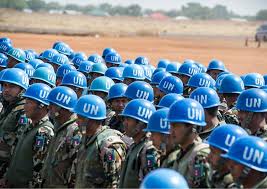India's Contribution to UN Peacekeeping Missions
Current Affairs NationalPosted by newadmin on 2025-01-30 09:04:37 |
Share: Facebook | Twitter | Whatsapp | Linkedin Visits: 28

India has a long-standing commitment to United Nations peacekeeping missions, a commitment highlighted by recent events in the Democratic Republic of Congo (DRC). Following the tragic deaths of peacekeepers, UN officials expressed their gratitude for India's contributions. Over the years, India has deployed a significant number of troops and police personnel to various missions, demonstrating its dedication to global peace and stability.
UN peacekeeping, established in 1948, is an international effort aimed at maintaining or restoring peace in conflict zones. It operates under key principles, including consent, impartiality, and the limited use of force, except in self-defense. Currently, around 100,000 personnel from 125 countries are engaged in peacekeeping missions worldwide. The first such mission, the United Nations Truce Supervision Organization, was launched in 1948. Since then, more than a million individuals have served under the UN flag in over 70 operations. These missions have evolved to address the complexities of modern conflicts, adapting to new challenges over time.
Despite its importance, peacekeeping faces significant challenges. Power politics often delay timely interventions, while resource constraints limit the effectiveness of missions. The changing nature of global conflicts has made traditional peacekeeping strategies difficult to implement. Additionally, resistance from host states has complicated peacekeeper deployments, a challenge seen in several African nations.
The recent conflict in eastern DRC, where M23 rebels are advancing, underscores these difficulties. Fighting in the region resulted in the deaths of six UN peacekeepers, including two from South Africa, one from Uruguay, and three from Malawi. The rebels, gaining control of new territories, pose a major threat to Goma, a city of around two million people. As a result, the UN relocated nonessential staff from Goma while continuing essential humanitarian operations such as food distribution, medical aid, and civilian protection.
The UN peacekeeping mission in Congo, known as MONUSCO, has been active for over 20 years, with 14,000 troops currently deployed. South Africa’s regional intervention force, SAMIDRC (Southern African Development Community Mission in DRC), also suffered casualties in the conflict. The M23 rebels, one of nearly 100 armed groups fighting in eastern Congo, have strategically captured key locations, such as Sake, a town 27 kilometers west of Goma. Backed by Rwanda, the group has taken advantage of political shifts in the United States to escalate its offensive, exacerbating one of the world’s largest humanitarian crises. Thousands of civilians remain at risk, drawing international concern and renewed UN efforts to stabilize the region.
India remains the largest cumulative contributor to UN peacekeeping, having deployed over 253,000 troops across 49 missions. Known for their technical expertise, Indian peacekeepers have provided medical and logistical support in various operations. India has also contributed specialized military resources, including helicopters and engineering units, to enhance the effectiveness of peacekeeping efforts. The Centre for UN Peacekeeping in New Delhi has played a crucial role in training over 67,000 personnel, focusing on key areas such as conflict resolution and the prevention of sexual exploitation.
India’s ongoing role in peacekeeping reflects its broader commitment to global security. As conflicts continue to evolve, India's contributions will remain crucial in supporting international peacekeeping initiatives and humanitarian efforts worldwide.
Search
Categories
Recent News
- Prostate Cancer Awareness: A Hospital's Initiative for Early Detection
- India's Data Revolution: AI Infrastructure and Job Creation
- Wildlife Haven Implicated in Madhya Pradesh's Meat Scandal
- Punjab Farmers' Fury: Protesting India's Trade Deal with US
- BJP's Maharashtra Alliance Strategy for Upcoming Local Elections
- BirlaNu's Billion-Rupee Bet on Fibre Cement
- Delhi Roof Collapse Claims Elderly Tenant's Life
- Competition Commission Targets IndiGo: Unfair Practices Under Scrutiny
Popular News
- Navigating IPO Market Dynamics Amid Volatility and Regulatory Changes
- Massive Worldwide Microsoft Outage Disrupts Multiple Sectors
- Panjapur Bus Stand to Reshape TNSTC Routes
- తెలుగుదేశం పార్టీ - పేదరికాన్ని నిర్మూలించడంలో వాగ్దానం
- Universities Embrace Remote Learning Technologies Amidst Ongoing Pandemic